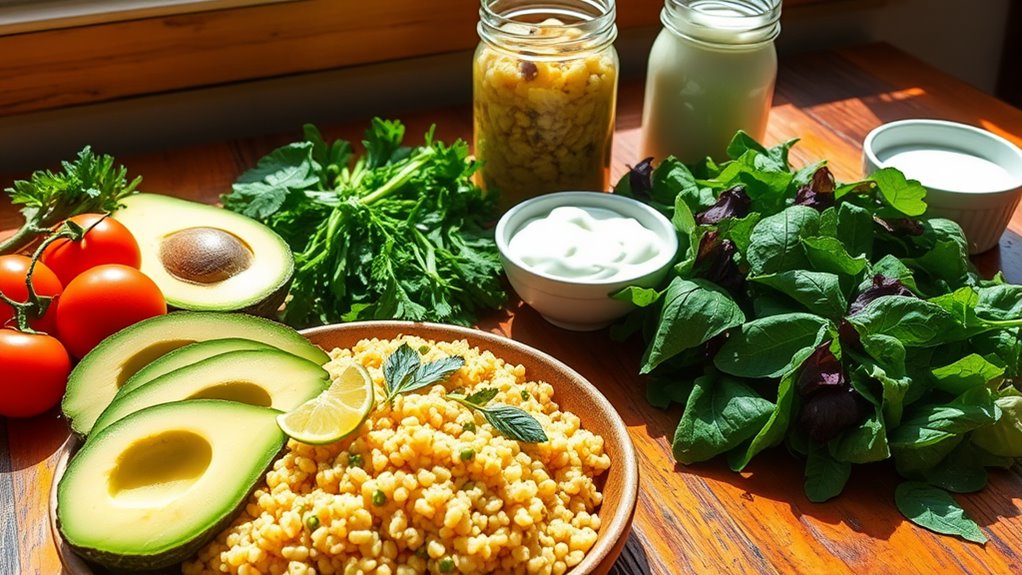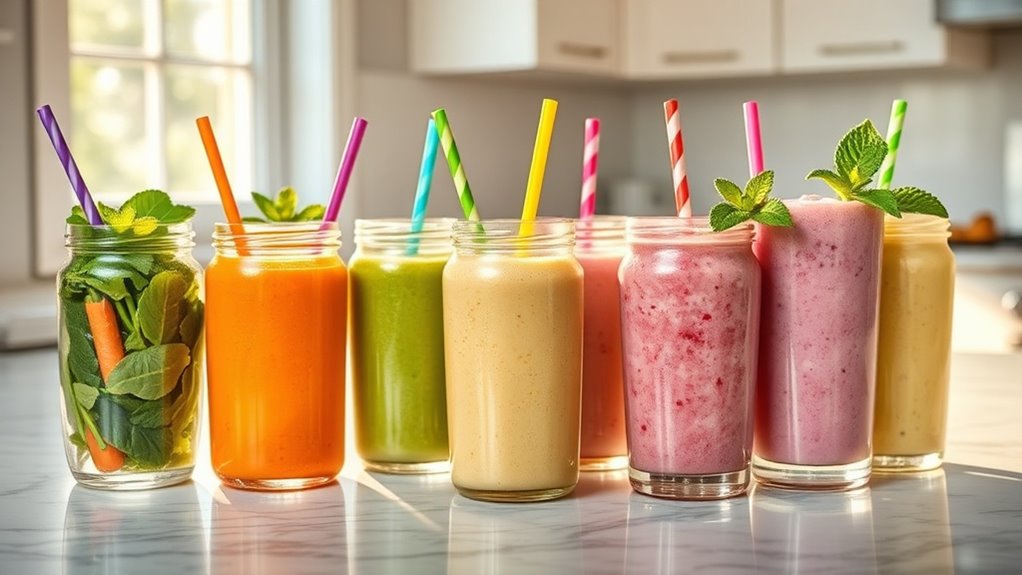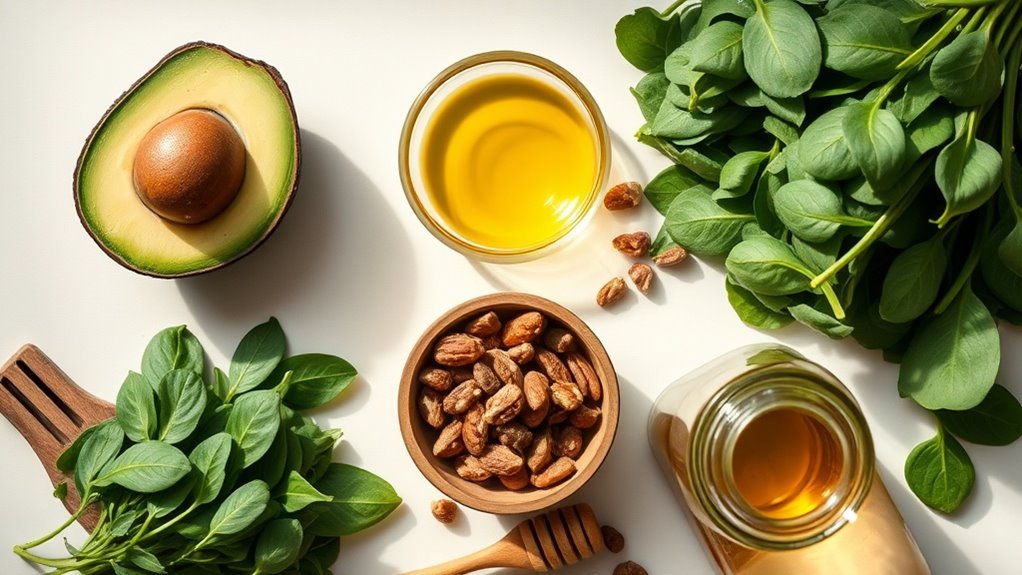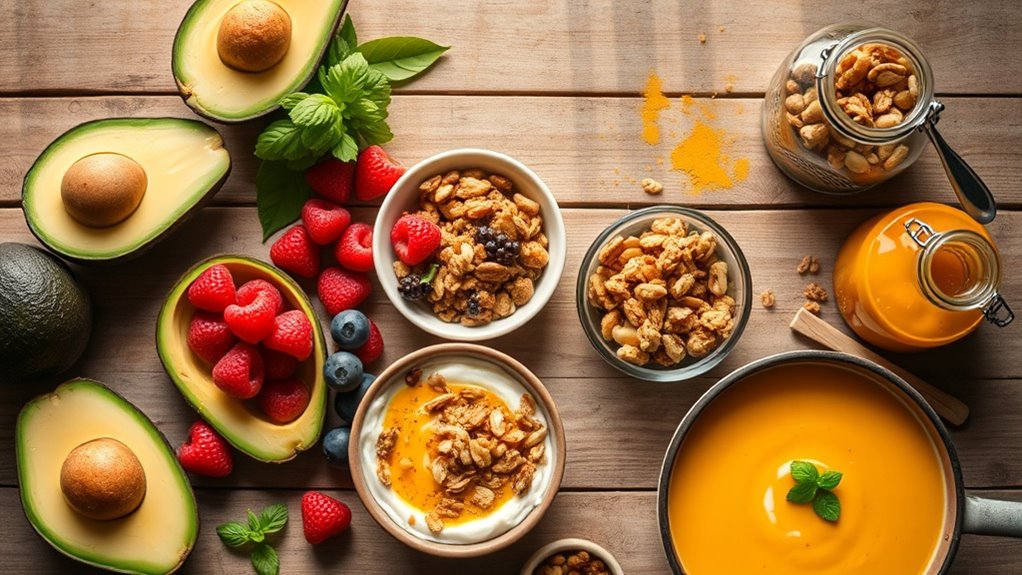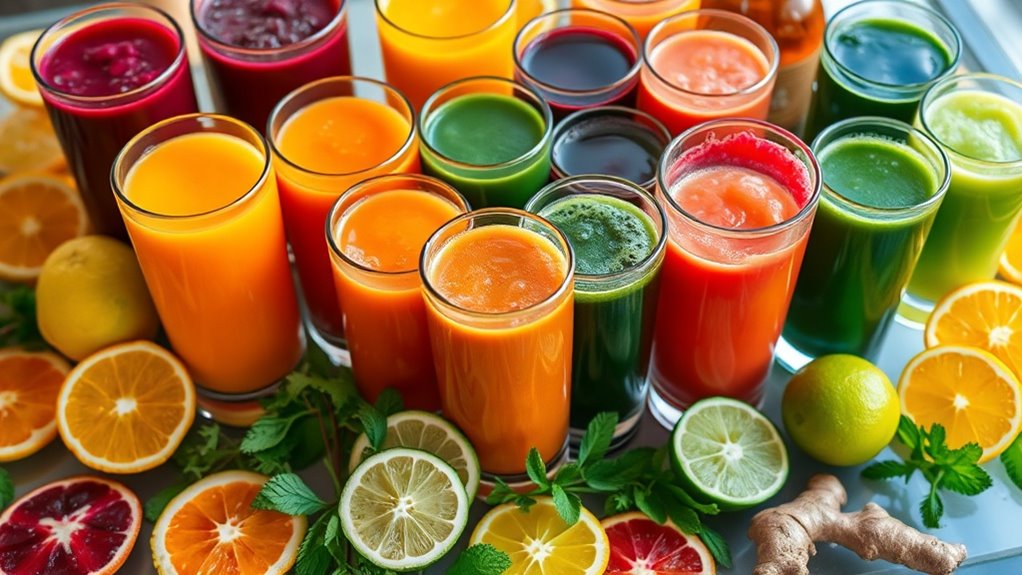The Simple Way I Added More Gut-Friendly Foods Into My Diet
To add more gut-friendly foods to your diet, start incorporating fiber-rich fruits and vegetables like berries and leafy greens. Include probiotic sources such as Greek yogurt and kefir to support your microbiome. Don’t forget to add prebiotic foods like garlic and whole grains, which nourish beneficial bacteria. Snacking on nuts and seeds boosts digestion, while staying hydrated enhances overall gut function. You’ll discover even more simple tips to improve your gut health as you explore further.
Understanding Gut Health
Gut health plays a crucial role in your overall well-being, influencing everything from digestion to immunity.
To maintain a healthy gut, you need to focus on gut support foods. These include fiber-rich fruits and vegetables, whole grains, and fermented items like yogurt and kefir.
Such foods promote the growth of beneficial bacteria, which can enhance digestion and protect against various diseases.
Additionally, incorporating nuts, seeds, and legumes into your meals can further support gut health. A balanced diet filled with these foods can significantly improve your digestion and overall health.
The Importance of Probiotics
Probiotics are a key component in maintaining a healthy gut microbiome.
These beneficial bacteria help balance your gut’s ecosystem, promoting digestion and enhancing nutrient absorption.
Research shows that probiotics can reduce symptoms of digestive disorders, boost your immune system, and even improve mental health.
By incorporating probiotic-rich foods like yogurt, kefir, and fermented vegetables into your diet, you can support your gut health.
Regular consumption of these foods encourages the growth of good bacteria, helping to fend off harmful pathogens. Additionally, a gut health smoothie can be a delicious way to add more probiotics and nutrients to your diet.
Choosing Fiber-Rich Foods
Choosing fiber-rich foods is essential for maintaining a healthy gut and overall well-being. Fiber aids digestion, helps regulate blood sugar, and keeps you feeling full longer. You’ll find plenty of delicious options, from fruits and vegetables to whole grains and legumes, to incorporate into your diet. Additionally, a simple habit of consistently choosing fiber-rich foods can significantly enhance your gut wellness.
Benefits of Fiber
Fiber is a crucial component of a healthy diet, offering numerous benefits for your digestive health.
Incorporating fiber-rich foods can enhance your well-being in several ways:
- Improves Digestion: Fiber aids in moving food through your digestive tract, preventing constipation.
- Supports Gut Health: It fosters the growth of beneficial gut bacteria, promoting a balanced microbiome.
- Regulates Blood Sugar: Fiber slows sugar absorption, helping keep your blood sugar levels stable.
- Promotes Satiety: High-fiber foods keep you feeling full longer, which can help manage weight.
Embracing fiber can lead to lasting health improvements in your daily life.
High-Fiber Food Options
A variety of high-fiber food options can easily fit into your diet, helping you reap the benefits of this essential nutrient.
Incorporate beans, lentils, and chickpeas into salads or soups for a protein-packed boost.
Whole grains like oats, quinoa, and brown rice provide excellent fiber sources.
Don’t forget fruits and vegetables—apples, pears, berries, carrots, and broccoli are all great choices.
Snack on nuts or seeds to add crunch and fiber to your day.
Incorporating Fermented Foods
How can you easily incorporate fermented foods into your diet?
Start by adding these gut-friendly options:
- Yogurt: Choose plain, unsweetened yogurt with live cultures for a probiotic boost.
- Kefir: This fermented milk drink is rich in probiotics and can be added to smoothies.
- Sauerkraut: Use it as a tangy topping for sandwiches or salads to enhance flavor and nutrition.
- Kimchi: This spicy fermented vegetable dish is perfect as a side or added to rice dishes.
Additionally, consider including a variety of fermented food sources to diversify your gut microbiome, which is essential for maintaining digestive health.
Exploring Prebiotic Options
Prebiotics are non-digestible fibers that feed the beneficial bacteria in your gut, helping to improve digestion and overall health. Some of the top prebiotic foods include garlic, onions, and bananas, which you can easily incorporate into your meals. Additionally, including gut-friendly foods in your morning routine can significantly boost your overall wellness and set a positive tone for the day.
What Are Prebiotics?
Incorporating prebiotics into your diet can significantly enhance gut health by feeding the beneficial bacteria residing in your intestines.
Prebiotics are non-digestible fibers that stimulate the growth of these good bacteria.
Here are some key points about prebiotics:
-
Sources: They come from foods like bananas, onions, garlic, and asparagus.
-
Function: Prebiotics help improve digestion and nutrient absorption.
-
Benefits: They can boost your immune system and may reduce inflammation.
-
Balance: A diet rich in prebiotics promotes a healthy gut microbiome, essential for overall wellness.
Start adding these to your meals for better gut health!
Top Prebiotic Foods
Adding prebiotic foods to your diet can be an enjoyable way to support your gut health.
Top options include garlic, onions, and leeks, which are rich in inulin, a well-known prebiotic fiber. Bananas, particularly when slightly green, offer resistant starch, promoting beneficial bacteria growth. Whole grains like oats and barley also serve as excellent sources. Don’t forget about legumes, such as lentils and chickpeas, which provide both fiber and protein.
Incorporating these foods can enhance your gut microbiome, leading to improved digestion and overall wellness. Enjoy experimenting with these tasty ingredients in your daily meals!
Incorporating Prebiotics Daily
How can you easily weave prebiotic foods into your daily meals?
Incorporating these gut-friendly options can be simple and delicious.
Here’s how to get started:
- Breakfast Boost: Add sliced bananas or oats to your morning yogurt.
- Snack Smart: Munch on raw garlic or onions in your salads or dips.
- Soup Sensation: Stir in some leeks or asparagus into your favorite soups.
- Savory Sides: Roast artichokes or sweet potatoes as a nutritious side dish.
Easy Recipes for Gut-Friendly Meals
What if you could whip up delicious meals that not only satisfy your taste buds but also nurture your gut?
Start with a quinoa salad, mixing cooked quinoa, cherry tomatoes, cucumber, and a lemon-tahini dressing.
Add probiotic-rich yogurt to a veggie stir-fry, incorporating garlic, ginger, and broccoli.
For breakfast, try overnight oats with almond milk, chia seeds, and berries.
These meals are packed with fiber and nutrients that support gut health.
Incorporating anti-inflammatory meals will also help reduce inflammation in your body, promoting overall wellness.
Remember, simple swaps like using whole grains and fresh veggies can make a big difference.
Cooking at home allows you to control ingredients while enjoying tasty, gut-friendly dishes.
Snacking Smart for Digestive Wellness
Smart snacking can be a game-changer for your digestive wellness.
Choosing the right snacks helps maintain gut health and keeps you energized throughout the day.
Here are four smart snack options to consider:
- Greek yogurt: Packed with probiotics, it supports gut flora.
- Raw veggies: Carrots and celery provide fiber, aiding digestion.
- Nuts: Almonds and walnuts offer healthy fats and protein.
- Fruit: Berries and bananas are rich in fiber and antioxidants.
Incorporating these snacks into your routine can help you feel better and support your digestive system, making it easier to fuel your body efficiently. Additionally, adding a diverse range of probiotics can significantly enhance your gut’s microbiome and overall health.
Staying Hydrated for Optimal Gut Function
While you might think hydration is only about quenching your thirst, it plays a crucial role in maintaining optimal gut function.
Drinking enough water helps digestion by breaking down food, allowing nutrients to be absorbed efficiently. It also prevents constipation by softening stool, making it easier to pass. Additionally, staying hydrated supports the mucosal lining of the intestines, which protects against harmful bacteria and promotes a healthy microbiome.
Furthermore, incorporating soothing herbal teas into your hydration routine can further enhance relaxation and digestive health. Aim for at least eight glasses a day, adjusting for activity levels and climate. Remember, herbal teas and water-rich fruits count too!
Prioritizing hydration can be a simple yet impactful way to boost your gut health.

